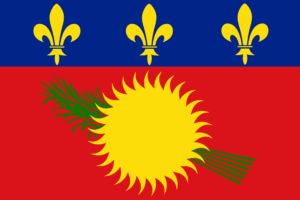Christopher Columbus landed in Guadeloupe in 1493 during his second voyage to the New World. Columbus also discovered pineapples during his stay in Guadeloupe.
France took control of the island in 1635 and became a French colony in 1674. The island soon became a profitable supplier of sugar cane. Over the next 100 years, the island changed ownership multiple times between England and France. In 2007, Saint-Martin and Saint-Barthelemy were separated from Guadeloupe and became independent French territories. Guadeloupe is still part of France and is therefore considered a member of the European Union.
| Capital | Basse-Terre |
| Population | 395,911 (Source: 2023 worldometer) |
| Major Cities | Les Abymes, Baie-Mahault, Le Gosier, Petit-Bourg |
| Borders | north of Dominica, and about 500 km southeast of Puerto Rico. |
| Gross Domestic Product (GDP) | $3,513,000,000 (2022 worldometer) |
| Currency | euro (EUR) |

Guadeloupe Major Industries: construction, cement, rum, sugar, tourism
Guadeloupe Agricultural Products: bananas, sugarcane, tropical fruits and vegetables; cattle, pigs, goats
Guadeloupe Natural Resources: cultivable land, beaches and climate that foster tourism
Guadeloupe Major Exports: bananas, sugar, rum, melons, spring water
Guadeloupe Major Imports: foodstuffs, fuels, vehicles, clothing and other consumer goods, construction materials
Total Size of Guadeloupe: 1,628 km2 (source: 2022 worlddata)
Geographical Low Point of Guadeloupe: Caribbean Sea 0 m
Geographical High Point of Guadeloupe: Soufriere 1,484 m
Climate of Guadeloupe: subtropical tempered by trade winds; moderately high humidity
General Terrain of Guadeloupe: Basse-Terre is volcanic in origin with interior mountains; Grande-Terre is low limestone formation; most of the seven other islands are volcanic in origin
World Region or Continent of Guadeloupe: Central America
Geographical Coordinates: 16 15 N, 61 35 W
Guadeloupe Government Type: republican form of government
Guadeloupe Nationality: Guadeloupian(s)
Guadeloupe National Holiday: Bastille Day, 14 July (1789)
Guadeloupe Independence: none (overseas department of France)
Guadeloupe National Symbol:
Guadeloupe National Anthem or Song: Land of the Free
Guadeloupe Languages Spoken: French (official) 99%, Creole patois
Guadeloupe Religions: Roman Catholic 95%, Hindu and pagan African 4%, Protestant 1%
Guadeloupe looks like a butterfly.
Guadeloupe’s first name was “Carquera”
Guadeloupe has an active volcano.
Guadeloupe is surrounded by picturesque coral reefs.
In Guadeloupe he ruled slavery until 1848.
Almost all Guadeloupe people are Roman Catholic. Guadeloupe is very far from France but still a French territory
Guadeloupe is actually an archipelago rather than an island.
Guadeloupe rum is famous
Some of the world’s best diving spots are in Guadeloupe
Guadeloupe has amazing national parks
Creole is the second non-official language of Guadeloupe
Christopher Columbus first discovered Guadeloupe
Guadeloupe has a local dance called “beguine”.
Guadeloupe is a tropical paradise where everything is magical

